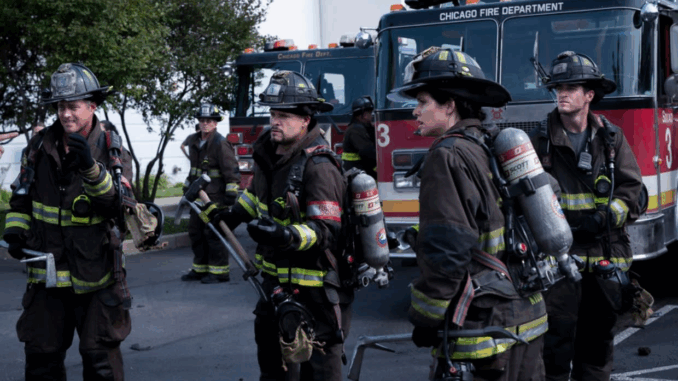
In Chicago Fire Season 14, flames once again roared through the city — but this time, the blaze wasn’t just another call for the heroes of Firehouse 51. It was personal. When Christopher Herrmann’s family home burned to the ground in Episode 4, it marked one of the show’s most devastating turns in years. Yet beneath the ashes and heartbreak lies something remarkable: a bold, emotional reset for both Herrmann’s story and the beating heart of Chicago Fire itself.
A Hero Without His Helm
Herrmann’s arc this season began not with tragedy, but with sacrifice. After more than a decade of service, he willingly stepped down from his post as lieutenant so that his lifelong friend and partner, Mouch, could take his turn in leadership. It was a decision rooted in loyalty — a classic Herrmann move. But it also left him adrift, unsure of who he was without the title that had defined him for so long.
Then came the fire.
In an episode that struck like a gut punch, Herrmann’s entire world went up in smoke. What was once a warm, chaotic home filled with laughter, family dinners, and the echo of a life well-lived became a heap of smoldering wreckage. Every photo, every keepsake, every tangible piece of his past was gone — except his family, who escaped unharmed.
Still, for Herrmann, survival wasn’t the same as being whole.

Ashes of Guilt and Brotherhood
What made this tragedy hit so deeply wasn’t just the destruction of the house — it was the quiet question that haunted Herrmann in the aftermath: Was it my fault?
He couldn’t stop replaying the thought that maybe his own handiwork, some small overlooked detail in the wiring, had sparked the blaze. The guilt was relentless, the kind that eats at the corners of a man’s conscience.
Enter Severide. The legendary investigator dove into the ashes and found the truth: a faulty switch in the kitchen had caused the inferno, not Herrmann’s work. Relief should’ve come instantly, but as any Chicago Fire fan knows, absolution doesn’t erase pain.
Mouch tried — in his blunt but heartfelt way — to remind Herrmann that possessions could be replaced, that what mattered most was family. But Herrmann, raw and grieving, pushed back. “Those weren’t just things,” he reminded him. “They were memories.”
And he was right.
Cindy’s Silent Strength Breaks
Amid Herrmann’s spiral, Cindy — the ever-steady anchor of the family — did what she’s always done: she held everyone together. She comforted the kids, made the calls, found the temporary housing, smiled through tears. But when she and Herrmann sifted through the rubble and found her mother’s ring — miraculously unscathed — the dam broke.
That single moment, captured in heartbreaking simplicity, was Chicago Fire at its finest. Robyn Coffin delivered a raw, soul-crushing performance that reminded fans why this show still burns so bright after more than a decade. Cindy’s breakdown wasn’t about a piece of jewelry. It was about everything she’d lost — and everything she’d been too strong to admit.
Flames That Forge the Future
If the Chicago Fire writers had chosen to use this storyline as a way to sideline Herrmann, it might have been understandable. But this tragedy feels like something more. It’s a test — not of his firefighting skills, but of his spirit.
Herrmann has always been the emotional center of Firehouse 51: part mentor, part comic relief, part father figure. But this season could redefine him entirely. The man who taught others how to rise from loss must now face that very lesson himself.
The story opens new paths not just for Herrmann, but for the ensemble around him. How will Mouch handle the guilt of having taken Herrmann’s position right before the tragedy? How will Severide, who has battled his own demons, support a brother in need? And will Chief Boden — the house’s spiritual rock — step in to guide Herrmann toward something bigger than rebuilding?
A Show That Still Burns Bright
After thirteen seasons and nearly 300 episodes, it’s easy to assume Chicago Fire might start losing its emotional spark. But this latest tragedy proves otherwise. Just as Severide’s reaction to last season’s pregnancy twist left fans in tears, Herrmann’s quiet devastation — and Cindy’s breaking point — remind us why Fire endures.
It’s not just about the rescues. It’s about resilience.
Chicago Fire has always been about what happens when the sirens fade, when the smoke clears, and when heroes are forced to rebuild — not the city, but themselves. Season 14 has found its heart again, and it’s beating louder than ever, forged in grief, love, and the promise of rebirth.
New episodes of Chicago Fire air Wednesdays at 9 p.m. ET on NBC, between Chicago Med and Chicago P.D., and stream next-day on Peacock.